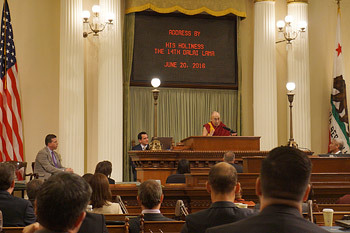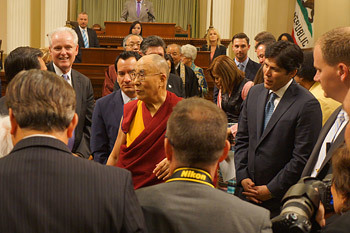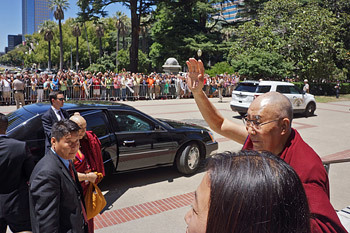Sacramento, CA, USA, 20 June 2016 - Leaving Los Angeles this morning under bright sunshine, on the longest day of the year, His Holiness the Dalai Lama flew to the California state capital of Sacramento. From the airport he drove to the Leland Stanford Mansion, the house that originally belonged to the founder of Stanford University that is now the state’s official reception centre. He was received by Governor Jerry Brown and his wife. They were joined for lunch by Senate President pro Tempore Kevin De Leon, Speaker Anthony Rendon and his wife, and Senator Janet Nguyen.
From the Leland Stanford Mansion it was short drive to the State Capitol. Tibetans in traditional dress bearing Tibetan flags and welcoming banners gathered in substantial numbers to cheer His Holiness as he arrived. He saluted and waved to them from the Capitol steps.
In the State Assembly the Speaker convened a joint convention and invited Rinban Bob Oshita of the Buddhist Church of Sacramento, a Jodo Shinshu Temple, to lead the prayer for the day. A committee was appointed to escort His Holiness to the rostrum. The Speaker introduced the President pro Tem, who introduced His Holiness the Dalai Lama to the joint convention. He described his humble origins and how in recent times he has received awards such as the Nobel Peace Prize in acknowledgment of his consistent message of peace, non-violence, compassion and inter-religious harmony, as well as his concern for our natural environment. He remarked that the convention had Senator Janet Nguyen to thank for inviting His Holiness to address them, noting that in these unsettled times love and compassion are necessities not luxuries.
His Holiness began by characteristically urging everyone to sit down and laughed as he explained how much he dislikes formality.
“Respected President and Respected Speaker, brothers and sisters,” he said, “basically we are all part of humanity, belonging to the same human family. Mentally, physically and emotionally we are the same. As social animals we need a sense of community, therefore we need to think in terms of our global well-being. It’s natural to take care of ourselves, but as social animals the best way to take care of ourselves is to take care of each other. Differences of faith, race or nationality are secondary in the context of our sameness as human beings.
“We are born the same way and we die the same way. After we’re born, our mother’s affection is essential to our survival. The affection we enjoy then is a source of security for the rest of our lives. Scientific findings suggest that basic human nature is compassionate. This is a source of hope, which would not exist if our basic nature were anger. It’s because we have hope that we can think of creating a happier more peaceful world. Peace in the world can only occur on the basis of inner peace. Leading a happy life depends on our mind’s being at peace. Plentiful material facilities by themselves don’t guarantee happiness, whereas someone who’s poor will be happy if they are surrounded by affection. We need to pay more attention to the inner values that are the key to our happiness.”
 |
| His Holiness the Dalai Lama addressing a joint
convention in the State Assembly in Sacramento, California on June 20,
2016. Photo/Jeremy Russell/OHHDL |
When it comes to relations between our major religious traditions, His Holiness said, they all have the potential to create more compassionate human beings. He explained that as social animals we have a natural sense of altruism, and as human beings we are able to use our intelligence to extend that sense of altruism to embrace all beings. His Holiness declared that his first commitment is to promoting awareness of human values as a source of lasting happiness.
His second commitment he described as working to foster inter-religious harmony, something he has seen flourishing in India where he has lived for more than five decades. Occasional problems flare up, he said, which is only to be expected in a population of more than 1 billion. Although there are those today who think of Muslims only in terms of militancy and violence, His Holiness said he has many Muslim friends who are wonderful people. There is clear evidence in India, he reiterated, that all our religions have the potential to create good human beings. And the way all major religious traditions have lived together there, side by side, for more than a thousand years is an example the rest of the world could learn from.
Noting that California is also a multi-ethnic, multi-cultural society, His Holiness urged the legislators to consider how to ensure respect and understanding among religious traditions. He also acknowledged the special efforts California has made with regard to environmental issues and climate change.
“We must protect this planet,” he said, “because it is our only home. The moon hangs beautifully in the night sky, but it is not somewhere we could comfortably live.”
He went on to observe that because education today has largely materialistic goals, there is a corresponding lack of human or inner values. The solution, he suggested, is to find a more universal approach to human values that can appeal to everyone without being limited to this or that faith. There is a need for what His Holiness refers to as secular ethics, secular not in the sense of dismissing religion, but secular as it is understood in India. There the word implies unbiased respect for all religious traditions. His Holiness commended the incorporation of secular ethics into the education system, something he appealed to the legislators to take seriously.

|
His Holiness the Dalai Lama with members of the legislature after his address at the State Assembly in Sacramento, California on June 20, 2016. Photo/Jeremy Russell/OHHDL
|
“Genuine peace in the world depends on our having peace in our hearts. If we are full of anger how can we expect to bring about peace? In this country there is talk about gun control, but real gun control starts here in our hearts with greater respect for the lives of others and their rights. To achieve peace we need a demilitarized world and to achieve external disarmament we have to start with inner disarmament.
“In our world we’re facing many problems. There is too much killing and killing in the name of religion is unthinkable. Since we human beings created many of these problems, we also have a responsibility to solve them. In the 20th century we tried to solve our problems by force, but now in our more interdependent, global world the use of force is out of date. In the 21st century a proper solution to problems is dialogue, meeting together and talking things through face to face.
“We may sometimes feel that we can’t do much as individuals, but humanity is made up of individuals; we can make a difference. As individuals we can influence our own families. Our families can influence our communities and our communities can influence our nations. Wherever I can I talk about these things because as human beings we can work together to make a better world. Thank you.”
Before leaving the rostrum His Holiness added that he has long considered the USA the leading nation of the free world. Within that context California is not only one of the largest states of the union but is also admired across the world as a major locus of innovation. He appealed to the legislators therefore to consider and support innovative changes to education that can lead to the emergence of happiness and peace for all human beings.
In the final paragraph of a prepared written statement he said:
“The time has come to take concrete steps to bring about a real transformation in the ways we educate our future generations. We need to combine both an education of the mind with an education of the heart so that our children grow up as responsible, caring citizens equipped to meet the challenges of today's increasingly globalized world.”
His Holiness was escorted to the Senate Chamber where he posed for photographs with members of the legislature. He met others during a short reception in the Capitol Rotunda before departing for the airport and flying to Salt Lake City, where many Tibetans turned out to welcome him. Tomorrow afternoon he will give a public talk on ‘Compassion and Universal Responsibility’ at the University of Utah.















